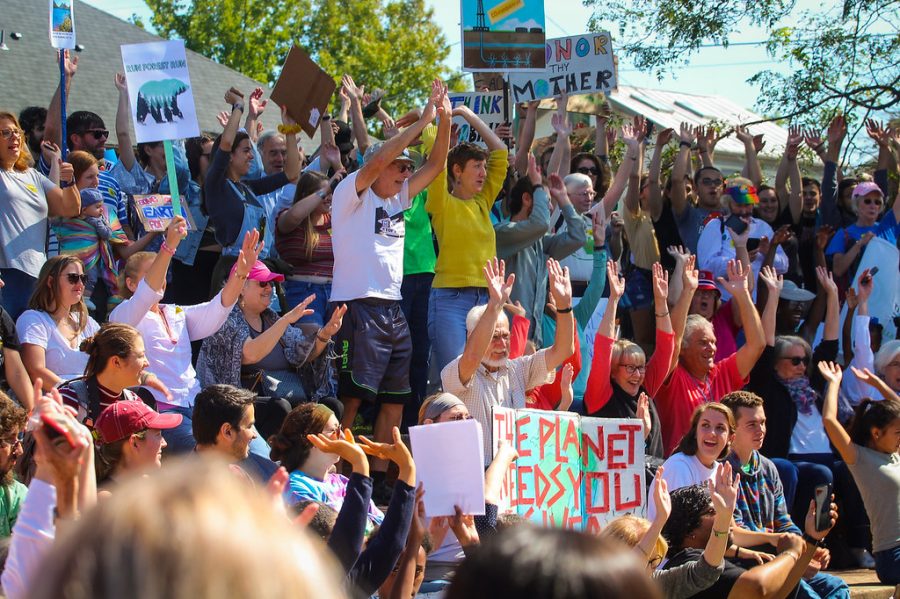Students and Lewisburg community join together for climate strike
September 27, 2019
On Sept. 20, approximately 600 students, faculty, staff and members of the Lewisburg community rallied together by Bertrand Library to kick off their local climate strike, organized by Green New Deal Lewisburg.
The strike was part of a global climate strike movement, intended in part to influence the United Nations Climate Action Summit that took place three days later on Sept. 23, where Swedish teen activist Greta Thunberg spoke. Over the past year, Thunberg has organized international weekly demonstrations titled “Fridays for Future” for students to take time off from school to engage in demonstrations and demand action against climate change. Thunberg’s speech at the United Nations was well-watched and reposted by major international news outlets. Millions of protesters attended strikes in 150 different countries. This included events in major cities such as New York City, Washington, D.C., Berlin and Sao Paulo, as well as relatively smaller demonstrations similar to the one in Lewisburg.
The Lewisburg climate strike began at 11:30 a.m., with some students walking out of their classes to support the initiative. Speakers addressed the crowd of protesters, laying out their calls for action from the University. According to Associate Professor of Environmental Studies and Sciences Andrew Stuhl, the group’s demands, which they voiced to University President John Bravman earlier this semester, included creating a “Sustainability Grove” by reforesting sections of the hill between Moore Avenue and Dent Drive, retiring the University’s co-generation plant by 2045, and creating a Presidential Task Force to examine divestment.
Stuhl mentioned that Bravman was “supportive” of the sustainability grove, but could not accept the other ideas at the moment. “President Bravman clearly understood the importance of the other two requests [or] issues. He sees the University from a very important perspective, as he works with staff, faculty and the Board of Trustees and must think about the educational and financial sides of University operations, among other sides,” Stuhl said. “He’s also an engineer by training, so he knows a thing or two about the technical aspects of electricity generation for an entire campus. For these reasons, I think, he had a harder time finding a workable solution to retiring the co-gen plant and creating a Task Force on Divestment.”
At 12 p.m., protesters walked down from the Malesardi Quadrangle to Hufnagle Park, where community members ranging from local preschoolers to government officials addressed the crowd.
“My favorite part of the strike was how intergenerational it was. Though the strike was mostly led by younger people, it was the intention to call all people to come together, and at our local level, I think that was accomplished,” alumna Sarah Wochele ’19 said.
Speakers mentioned the need for urgent action to mitigate the effects of climate change on the environment. Younger speakers also emphasized their hope that the generations currently in power would not jeopardize the future. Lewisburg Mayor Judy Wagner also addressed the crowd, reading a proclamation calling for a climate action resolution from the borough council. Additionally, Wagner addressed the fact that low-income residents have been historically disadvantaged by fossil fuel-based energy.
“Over 1,000 mayors have signed on to the U.S. Conference of Mayors Climate Protection Agreement plus 100 U.S. municipalities promised to transition to 100 percent renewable energy by 2050 at the latest,” Wagner said.
Wagner continued to praise the benefits of environmentally-friendly energy options. “The cost of non-fossil fuel-generated energy, including solar, wind and geothermal power, has fallen to the point that the replacement of fossil fuel energy with renewable energy is reaching price parity with nonrenewable energy,” she said.
Lewisburg resident Bruce Jackson was “impressed” with the turnout and enthusiasm at the strike. Jackson thinks that going forward, Lewisburg could improve in having residents with varying perspectives be respective of one another. “The people who have progressive attitudes may judge the people who don’t as ‘ignorant,’ ‘fools,’ whatever. That’s not productive. You have to realize that people have different opinions because they come from a different background – perhaps different educational backgrounds, different cultural backgrounds,” Jackson said.
“I was pretty blown away by the turn out of the strike,” Wochele said. “I hope locally that more youth recognize the power they hold in this movement to make meaningful changes in standing up for the future of everything.”
Dylan Pappas ’21 attended the strike and thought the Lewisburg children’s role of marching and speaking was particularly powerful. The strike was also a way of “showing signatures and showing an active campus is going to be the way that we make the administration make changes,” Pappas said. “They brought three different ideas to Bravman and he rejected two of them and I believe that’s mainly due to the lack of support that’s coming from the entire campus. If there was that pressure, changes would be made.”
“The climate movement doesn’t have the money the fossil fuel industry does to fund campaigns, but we can show with our numbers and our voice that we’re still here. If enough people unite, it will scare existing institutions of power into pushing towards change,” former President and current Treasurer of the Environmental Club Layla Gordon ’20 said.





















